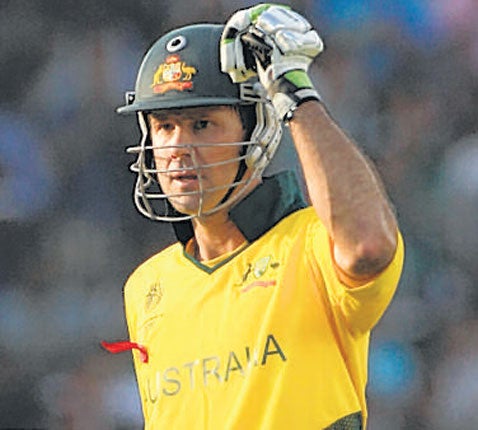James Lawton: Ponting gives reminder that his love of a battle is still undimmed
'Punter' has been a harshly abrasive character at times but always there has been a rough humour and relish for the battle which has set him apart

Your support helps us to tell the story
From reproductive rights to climate change to Big Tech, The Independent is on the ground when the story is developing. Whether it's investigating the financials of Elon Musk's pro-Trump PAC or producing our latest documentary, 'The A Word', which shines a light on the American women fighting for reproductive rights, we know how important it is to parse out the facts from the messaging.
At such a critical moment in US history, we need reporters on the ground. Your donation allows us to keep sending journalists to speak to both sides of the story.
The Independent is trusted by Americans across the entire political spectrum. And unlike many other quality news outlets, we choose not to lock Americans out of our reporting and analysis with paywalls. We believe quality journalism should be available to everyone, paid for by those who can afford it.
Your support makes all the difference.You never give up on a true champion, no more than he does himself, until the last bell has sounded and so it was good that at the end of arguably the greatest of cricket dynasties Ricky Ponting provided maybe a last and irrefutable statement of his status.
In some quarters he has been a figure of derision for a considerable time but his achievement yesterday reminded us that these are areas of opinion which might benefit from a splash of disinfectant.
"Punter" has been a harshly abrasive character at times, he has rarely dazzled us with his charm, but always there has been a rough humour and a relish for the battle which has set him apart from so many of his rivals.
As India swept over his Australian team – though only after some cricket as absorbing as it ever gets over one of its shorter courses – and ended their 12-year reign as world champions, it was clear that Ponting had saved some of the best of himself for a final curtain.
His 104 was a superb statement of resistance to the myriad talents of India and their enduring centrepiece, Sachin Tendulkar.
"The Little Master" will have to wait a little longer for his 100th international century but he is too generous a competitor to begrudge yielding the stage, at least for a day, to the batsman of his generation who had come closest to rivalling his own extraordinary deeds.
When it became clear that India would indeed prevail, you could see that much of Ponting's cricket life was passing before his eyes – and especially the last few hard months of it. During the Ashes series he rode an ever mounting tide of criticism.
It seemed at times that he was personally responsible for the decline of Australian cricket that had been marked by the passing of Glenn McGrath, Shane Warne, Adam Gilchrist and Matthew Hayden. Perhaps if he went too, with his broken-down game, his shattered finger, and his futile tactics, there would be some kind of magical rebirth. But then Michael Clarke stepped forward, tremulously for one Test match, and the pounding went on.
Ponting's problem, with his three Ashes defeats, has been that he came in at the fag end of empire. Of course, he had some wonderful moments on the way to becoming the most productive Australian batsman since Sir Don Bradman, but it was Allan Border and Mark Taylor and Steve Waugh who had the best of it, the deepest strength, the most ingrained confidence.
Yesterday Ponting fought at his very limits to preserve the possibility of one last winning statement, a fourth World Cup win and third as captain. It might just have happened if Australia's spin bowling hadn't become a parody of the Warne days and pacemen like the great veteran Brett Lee and Mitchell Johnson and Shaun Tait had managed to keep their discipline when the pressure rose.
Some suicidal running between the wickets brought on a brief attack of Indian panic, but they had too many guns, too much momentum.
It meant that when the denouement came Ponting was best qualified to hold up his head. His innings was a jewel of practical brilliance. He has been unable to hook and sweep with God-like facility for some years now and when he fell, essaying one of his first known attempts at the reverse sweep, there was another dab of pathos.
Was it confirmation that Ponting was, finally, out of his time? Despite his protests, maybe it was; but then he was some champion and if he does go now it was some farewell.
Join our commenting forum
Join thought-provoking conversations, follow other Independent readers and see their replies
Comments